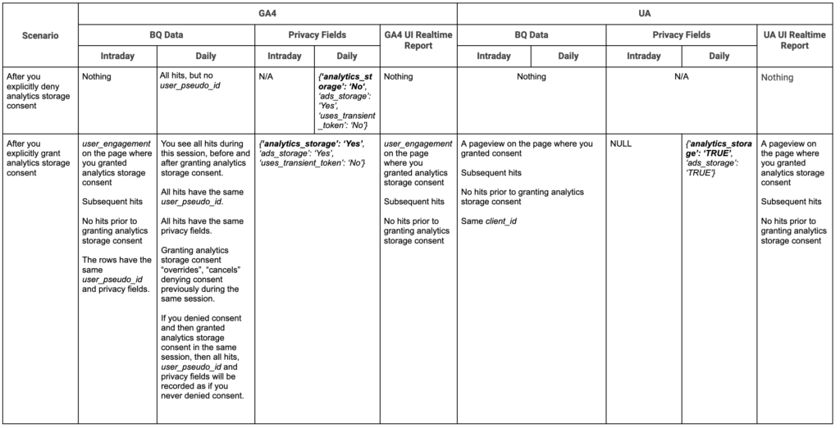The world of web analytics is rapidly evolving. Digital privacy is front and center with recently announced changes by Google, including Consent Mode and a plan to discontinue Universal Analytics in 2023. You may be wondering how these changes affect what data is being collected by Google Analytics (GA). Let’s explore what data gets recorded in Universal Analytics (UA) and Google Analytics 4 (GA4), both UI and BigQuery (BQ), based on analytics storage consent (whether it’s granted or denied).
About Consent Mode
Consent Mode (beta) allows you to adjust what data Google tags collect, based on the consent status that users select. Consent Mode empowers users by giving them more control over what data gets collected. Types of consent include Analytics and Ads cookies. At the time of writing, Consent Mode is still in beta and changes are possible before it becomes generally available. Read more about Consent Mode here.
How We Ran Our Tests
To better understand how denying or granting analytics storage consent affects what data is being collected by GA, we conducted some tests.
We performed the following steps as part of our tests:
- Built a simple website
- Installed both UA and GA4
- Linked both UA and GA4 to BQ
- Granted analytics storage consent and engaged with the website
- Denied consent and engaged with the website
- Checked what data got recorded in UA, GA4, including both realtime UI report and BQ
Notes about the tests:
-
Important: when you landed on the website, consent was denied by default.
-
It was tested on web and not mobile.
Our Observations
RECORDED DATA IN GOOGLE ANALYTICS (BASED ON CONSENT MODE)

Note: The most important cell shows data recorded in daily GA4 tables in BQ after the user explicitly grants analytics storage consent.
Additional notes:
After analytics storage consent is denied, UA will not store any subsequent hits. Unlike UA, GA4 will store hits even after analytics storage consent is denied. However, GA4 subsequent hits will be anonymized: they will have no user_pseudo_id.
When analytics storage consent is granted, UA will only store hits (with their client_id) that happened after it was granted. GA4 will record all hits during the session, both before and after granting consent, with the same user_pseudo_id.
If you first deny analytics storage consent and then grant it during the same session, all data will be recorded in GA4, as if you never denied consent.
Keep an eye on our blog for more information about consent management. In the meantime, if you have questions about what data gets recorded in UA and GA4, based on analytics storage consent, please don’t hesitate to contact us.



